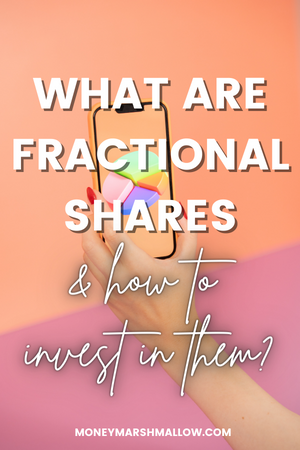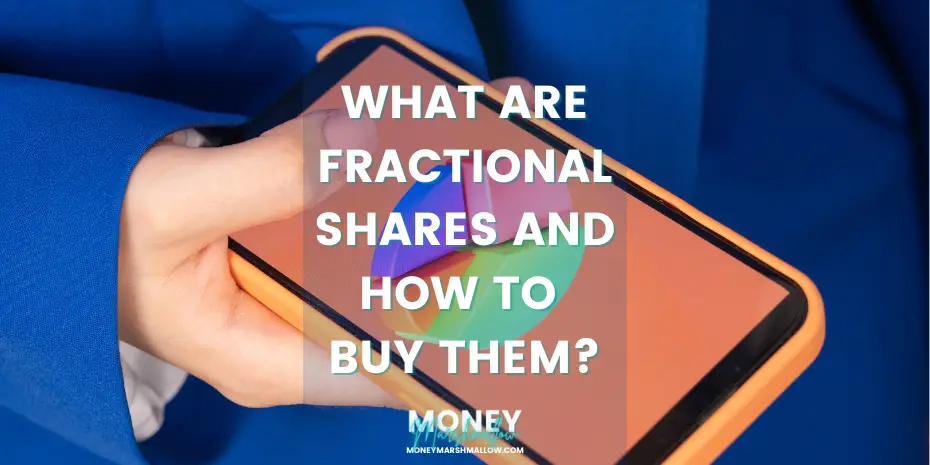I believe fractional shares are revolutionising how people invest, particularly in markets where some stocks are very expensive.
Personally, I have benefited from buying fractional shares enormously back when I didn’t have the funds to buy full shares.
I still buy fractional shares to this day as part of my 80/20 strategy where I invest 20% of my monthly contributions into individual stocks.
The changes in technology with the introduction of mobile investing apps have created a stream of new retail investors that now have access to the stock market through fractional shares.
In this article, I will demystify what fractional shares are, why they exist, and provide a comprehensive guide on how to buy them in the UK.
How to buy fractional shares - Quick guide
- Select a Broker: Choose a broker that offers fractional shares and is accessible to UK residents. I recommend platforms like eToro or Trading 212 for their user-friendly interface and low fees.
- Open an Account: Once you’ve selected your broker, you’ll need to open an investment account. This usually involves providing some personal information and verifying your identity.
- Fund Your Account: Deposit funds into your trading account using one of the available methods, such as a bank transfer or a debit card. Most platforms allow you to start with a small amount.
- Search for Stocks: Use the broker’s search feature to find the stocks you’re interested in. You’ll typically have the option to buy them as fractional shares.
- Make the Purchase: After you’ve selected your desired stock, specify the amount of money you want to invest in fractional shares of that stock and execute the buy order.
Click here and join Trading 212 with my referral link to get a free fractional share!
What are fractional shares?
A fractional share is precisely what it sounds like—a fraction of a single share in a company.
Unlike buying a full share, which might cost you a substantial amount, you can own a piece of a company by investing in fractional shares.
Why do fractional shares exist?
Fractional shares are born out of the need to make investing more accessible.
Imagine wanting to buy a share of Netflix but being put off by its high price.
With fractional shares, you no longer have to sit on the sideline; you can invest with as little as a few quid.
Essentially more people in the markets are better for every investor and providing access to those who were previously priced out adds an enormous amount of liquidity to the stock market.
Related: Investing for beginners: How to start investing in the UK
Advantages of fractional shares
Fractional shares allow you to diversify your portfolio without breaking the bank.
The lower entry barriers enable you to spread your investments across a variety of companies. I always say diversification is key to risk mitigation.
Drawbacks of fractional shares
It’s crucial to acknowledge that fractional shares come with limitations.
The liquidity can be lower, and you don’t get the voting rights a full share offers. However, I think the benefits often outweigh these drawbacks for most retail investors.
How fractional shares work in the UK
In the UK, the Financial Conduct Authority (FCA) regulates fractional shares, ensuring they meet certain standards for investor protection.
Naturally, I find this quite reassuring as a UK-based investor.
Taxes and fractional shares
You are liable to pay capital gains tax on any profits you make from your fractional shares but I recommend using a Stocks and Shares ISA to shelter some of those gains.
If you do need to invest inside a General Investment Account (GIA) just note that any profits above £6,000 in a tax year will mean you have to pay capital gains tax.

How to buy fractional shares -
Full guide
1. Choose your broker wisely
First things first, selecting a broker is your gateway to the world of fractional shares. Don’t rush into this; take your time to assess what different brokers offer.
If you’re an active trader who plans to frequently buy and sell fractional shares, opt for a broker with minimal trading fees. For those still wet behind the ears in the investment world, pick a broker offering robust educational content or social trading options.
Always confirm that the broker you’re leaning towards provides access to fractional shares, especially if you’re based in the UK like me.
The process usually involves a straightforward identity verification where you’ll be asked for your personal details, National Insurance number and bank details.
2. Fund your account
After setting up your brokerage account, you’ll need to fuel it with some cash.
The funding process generally involves choosing a deposit method—whether it’s a debit card or a bank transfer—and deciding on the amount. It’s crucial to be mindful of your initial deposit.
Parking too much money in an uninvested state won’t earn you interest, and given inflation rates, this can chip away at your cash’s purchasing power over time.
3. Identify your target fractional shares
With your account ready and funded, you’re set to explore the marketplace. Focus on identifying which companies catch your eye for fractional share investment.
Companies with high-value shares are often good candidates for fractional investments. You get a slice of the action without the need for hefty investment sums.
4. Enable fractional share buying and specific volume
Before you proceed to buy, make sure your broker’s fractional share feature is activated. This can sometimes require a special request. After that, determine the volume or monetary value of fractional shares you wish to own.
Your broker’s platform should have options for specifying this.
5. Enable fractional share buying and specific volume
Finally, it’s game time! Once you’ve set the number of fractional shares you want, proceed to execute the buy order. After the transaction is complete, your newly acquired fractional shares will be reflected in your portfolio.
Now, the task switches to monitoring your investments. Whether you’re in for the dividends or planning to capitalise on price surges, keeping an eye on your portfolio is key.
What are the best brokers to buy fractional shares?
Criteria for choosing a broker
When it comes to selecting a broker, consider factors like user interface, customer reviews, and of course, fees. A reliable broker enhances your trading experience.
Top brokers in the UK
Freetrade, Trading 212, and eToro are among my top picks for buying fractional shares in the UK.
These platforms combine low fees with an intuitive user experience, making them ideal for both novice and experienced investors.
They also allow low-cost entry points with Freetrade and Trading 212 allowing you to invest from £1. eToro is slightly higher but provides access to copy trading a tool where you can track the portfolios of popular investors.
Click here and join Trading 212 with my referral link to get a free fractional share!
Portfolio diversification
One of the great advantages of fractional shares is the opportunity they afford for portfolio diversification. Normally, you might find that high-value stocks — like those in tech giants such as Amazon or Tesla — are out of your reach, financially speaking.
However, with fractional shares, you can get a piece of these companies without having to part with a significant sum. What this means in practice is that you can own a slice of various companies across different sectors — technology, healthcare, renewable energy, and more — and even diversify geographically.
For example, I like to have a balance of UK-based companies and international giants in my portfolio. This multi-sector and multi-region diversification is a powerful hedge against localised economic downturns and sector-specific risks.
Risk management
Diversification isn’t just about expanding your reach; it’s also an integral part of risk management. The old saying “don’t put all your eggs in one basket” holds especially true in investing.
If you pour all your money into a single stock or sector, you’re exposing yourself to a high level of risk. What if that sector faces a sudden downturn? Or what if that single stock plummets overnight due to unforeseen circumstances?
By spreading your investments across different sectors and even geographies through fractional shares, you’re effectively diluting your risk. So, if one part of your portfolio underperforms, it’s likely to be offset by another part that is doing well.
In my own portfolio, I always make sure to allocate assets in a way that is not too heavily weighted in any single investment. That way, I ensure I am shielded from the volatility that can come with being too concentrated in one area.
Frequently asked questions
Is it a good idea to buy fractional shares?
In my opinion, buying fractional shares is an excellent idea for most retail investors. They offer an affordable pathway to diversification and allow you to invest in companies you believe in.
Is there a downside to fractional shares?
The downside to fractional shares includes limited voting rights and lower liquidity. While these drawbacks exist, I find that the benefits generally overshadow them.
Can fractional shares make you money?
Absolutely, fractional shares can be as profitable as full shares if you invest wisely. Your percentage gain or loss will be the same, whether you own a full share or a fraction of it.
Conclusion
I find that the flexibility and accessibility of fractional shares make them an invaluable addition to any investment portfolio.
Whether you are a novice or an experienced investor, fractional shares offer a cost-effective way to invest in high-value companies and diversify your portfolio.
Click here and join Trading 212 with my referral link to get a free fractional share!
Happy investing!
This guest post was provided by Sammie Ellard-King, a money expert and business owner passionate about helping you take control of your wallet. His mission with Up the Gains is to create a safe space to help improve your finances, cut your costs and make you feel good while doing it.
The article contains referral links. By using our referral links, we may earn a referral bonus.

